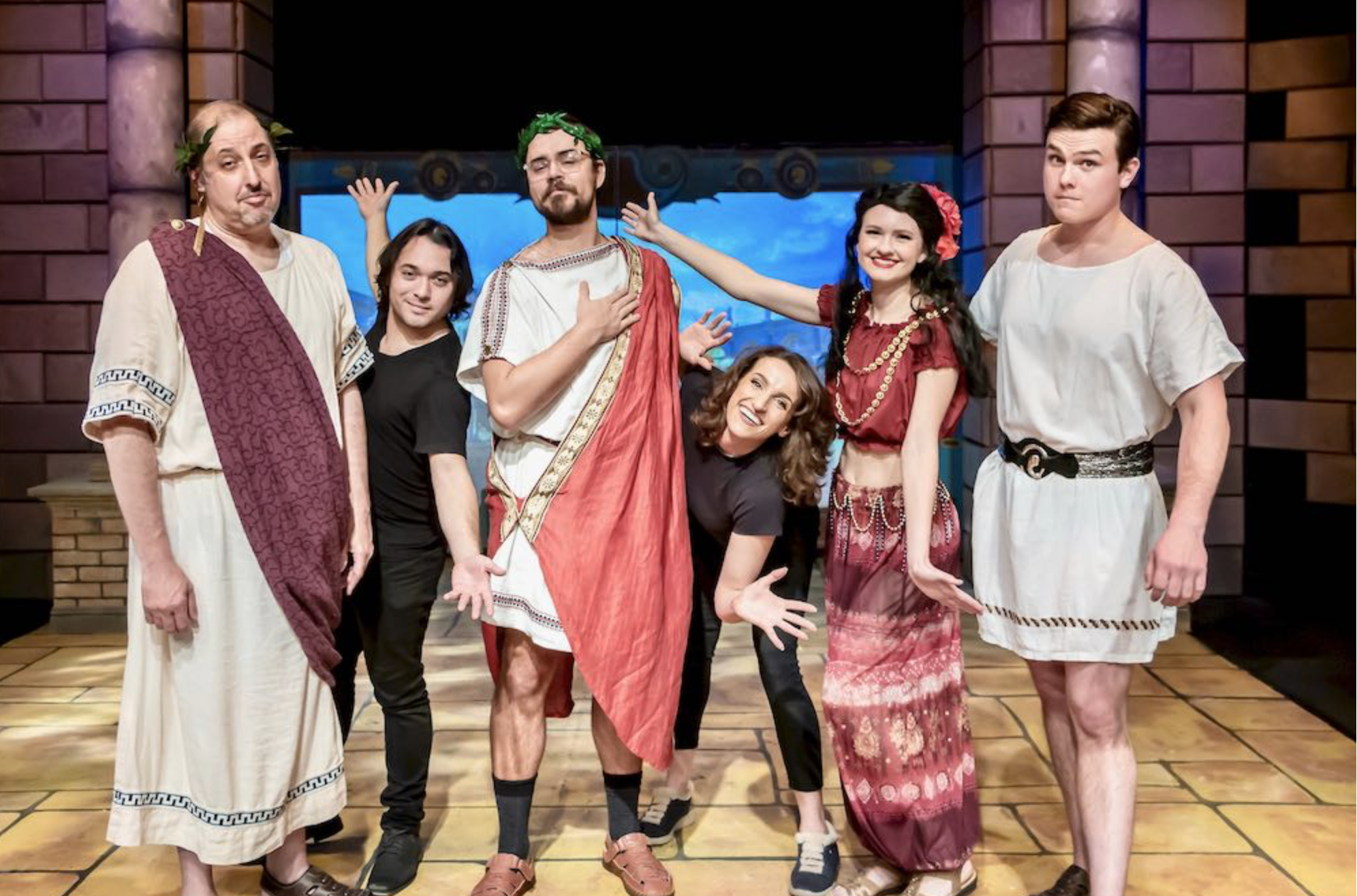You may recall seeing snippets of Williams Wyler’s 1959 film “Ben Hur,” such as a buff Charlton Heston driving a team of horses in an iconic chariot race, surrounded by a cast of thousands in a Roman colosseum. But can you imagine the entire saga staged by four intrepid actors?
Look no further for such an epic feat than Long Beach Playhouse’s production of Patrick Barlow’s “Ben Hur,” continuing through March 23 and designed to keep you chuckling for two hours by cast members who charm with their enthusiasm.
Based on the 1880 novel “Ben-Hur: A Tale of the Christ” by Civil War general Lew Wallace – who bears a striking resemblance to KFC’s Col. Sanders in the play – we get the tale of Judah Ben Hur, a Jerusalem man who becomes a galley slave under Roman rule and eventually a famous chariot racer.
Support arts & culture coverage
Long Beach is home to a vibrant community of people who celebrate culture through art. Their stories deserve a platform.
When he can remember his past amid the fog of slavery and decadence of Roman wealth, Judah pines for his mother Sarah and sister Tirzah, who seem Jewish by way of Brooklyn.
There’s also family servant Esther back home, who grew up with Judah and loves him. Not to mention Messala, adopted into the Hur household but now a Roman governor and Judah’s chariot-racing rival.
Making mystical appearances throughout the tale is a certain holy man born in Bethlehem in an early scene, who compassionately slakes Judah’s thirst while he is dragged into slavery, perhaps saving his life.

It’s surprising that this entire story comes across at all given that we also get interpersonal romantic dynamics among the actors – members of the Daniel Veil Theatre Troupe who are ostensibly staging this play for the first time.
Daniel (Grant Thackray), who introduces the troupe and plays Judah, loves Crystal (Amara Phelps) – who plays blonde sister Tirzah and brunette servant Esther, sometimes in the same scene – and who clearly doesn’t reciprocate Daniel’s feelings.
When Daniel discovers Crystal snuggling behind a prop with Omar (Devin Ricklef) – who plays Messala in a Roman toga and helmet, and also Jesus in flowing locks and robes – the line between Judah’s story and the troupe’s begins to blur.
Carrying us through this potential mayhem is the infectious energy of the actors, all of whom seem to have fun playing their often physically challenging roles.
Thackray draws our sympathy as the somewhat geeky Daniel, invested in staging the epic even with his deluded heart broken. Devin Ricklef as Omar believably overplays Messala with Shakespearean gravitas, while also embodying Jesus’s love-thy-neighbor hippie aura.
Playhouse veteran Eric Schiffer completely owns his turns as the Southern-accented Wallace (a.k.a. Col. Sanders), Judah’s stereotypical Jewish mother, one of the three Wise Men riding a prosthetic camel and an effete Roman politician who takes a liking to enslaved Judah.
And Amara Phelps shines as Crystal (as she has in previous Playhouse productions, such as “The Revolutionists”), delightfully alternating between Tirzah’s valley-girl inflections and Esther’s thick New Yorkese in rapid succession.
Two stagehands, played by Charlie Rodriguez and Jackie Shearn, jump into other roles as needed, including animals. Shearn manages to steal every scene she’s in, whether as a sheep in the manger, a horse anxious about being patted by Jesus or a cheerleader at the colosseum chariot-race showdown between Judah and Messala.
Yes, there is indeed a chariot race, staged how you might imagine creating it with friends in your living room when your parents aren’t home, using boxes and anything with wheels.
There are also dummies adding bodies when needed, such as on the Roman galley – where enslaved Judah is an “oarsome” oarsman – which gets attacked by pirates who get tossed into the audience in the ensuing melee.
The audience also gets to participate in what the Playhouse describes as “historically accurate” rowing and dialogue, as led by Daniel and the troupe, adding a lively dimension to the sea battle.
Background video projection also adds dimension to the stage, with cheesy budget imagery and sudden scenic and musical cuts adding humor.
As directed by Gregory Cohen, pacing is a bit slow at first, but gets more fluid as the story unfolds. However, time between scenes can feel a beat too long while the small troupe is backstage changing costumes and wigs, often with comical mixed success.
Goofy and charming, “Ben Hur” is a fun romp, perhaps even more so after a wine or beer from the Playhouse’s concessions. It may also be fitting for Easter, though how Jesus “relieves” Judah’s thirst may be too cheeky for some, also how he has to be a puppet sometimes. But with these and other chuckles comes a miraculous message of love and family – epic indeed.
“Ben Hur” continues at Long Beach Playhouse’s Mainstage Theatre, 5021 E. Anaheim St., through March 23, with performances Fridays and Saturdays at 8 p.m. and Sundays at 2 p.m. Tickets are $20 to $25 and can be purchased by calling the box office at (562) 494-1014 or visiting LBPlayhouse.org. Run time is 2 hours and 30 minutes, including intermission.

